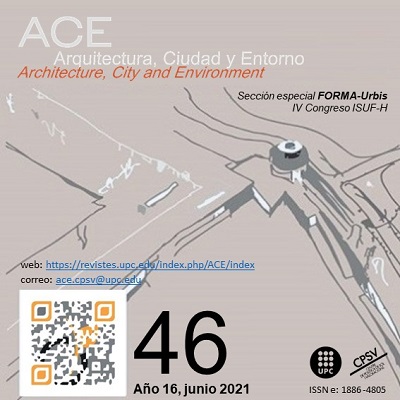COVID-19 and City: Towards an Integrated Model of Housing, Microbiology, Environment and Urbanism
DOI:
https://doi.org/10.5821/ace.16.46.9645Keywords:
Coronavirus, vulnerability, energy poverty, overcrowdingAbstract
As of May 2020, the global health crisis caused by the SARS-CoV-2 virus moves its epicentre to Latin America, with cities showing high rates of poverty, segregation, and overcrowding. Current advances in microbiology make it possible to understand in depth the relationships between cities, COVID-19, and other microorganisms, but a conceptual framework to articulate them is lacking, especially in contexts where social determinants are so relevant. This article proposes an integrated approach to microbiology, housing, environment, and urbanism, based on a model of interactions and an empirical analysis applied to Santiago de Chile. It was possible to analyse how the propagation of COVID-19 in the city is enhanced by vulnerabilities of socio-spatial, residential and urban health, including an approach from the concept of energy poverty. At the same time, it was possible to verify how the variables associated with these vulnerabilities allowed to explain the incidence rate per 100 000 inhabitants through the different communes of Santiago de Chile. Among these, the level of housing overcrowding, the number of households with heads of household in precarious employment, and travel to the central business district stand out. Finally, the need for microbiological sampling to improve housing conditions, neighbourhoods, and cities propose a new research agenda for this Urban Microbiome" multidisciplinary team, contributing to overcoming the vulnerabilities identified in this research.
Downloads
Published
Issue
Section
License
| INTELECTUAL PROTECTION CRITERIA |
At this moment, it is count with the "Oficina Española de Patentes y Marcas", while global protection it is being processed by the World Intelectual Property Organization (OMPI/WIPO). Nevertheless the International Standard Serial Number Office (ISSN) has given the following numbers ISSN: 1886-4805 (electronic version) and 1887-7052 (paper version). All articles will be peer reviewed, using double blind reviewing. |
| COPYRIGHT |
The article contents and their comments are authors exclusive liability, and do not reflect necessarily the journal editor commitee's opinion. All ACE published works are subject to the following licence CC BY-NC-ND 3.0 ES http://creativecommons.org/licenses/by-nc-nd/3.0/es/ It implies that authors do not hold nor retain the copyright without restrictions but only those included in the licence. |





































